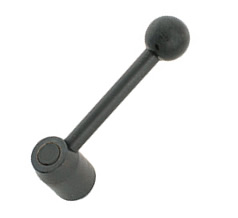
Some machinery adjustment and clamping processes require more torque than others. For high-stress applications such as these, you may want to use a heavy-duty lever arm. They feature a handle that you can grab and turn to adjust the machinery with which it’s used. Here’s how to choose the right heavy-duty lever arm.
Metal Construction
You should look for a metal construction when choosing a heavy-duty lever arm. Lever arms are available in different materials. Some of them are made of plastic, whereas others are made of metal. While plastic lever arms are lightweight and inexpensive, they lack the strength and durability of their metal counterparts. You’ll be able to apply more torque using a lever arm made of metal, such as stainless steel or cast iron. The ball at the end of a heavy-duty lever arm can be made of plastic, but the handle should be made of metal for maximum turning power.
Protective Finish
Don’t underestimate the importance of a protective finish. Metal lever arms can corrode when exposed to humidity and moisture. Even when made of stainless steel, humidity and moisture can trigger an oxidative reaction that leads to corrosion. With a protective finish, though, corrosion isn’t a concern. You can find heavy-duty lever arms with a black oxide protective finish. Also known as blackening, this finishing process involves the application of a passivating, protective layer over the surface of an object.
Tapped vs Reamed
Heavy-duty lever arms are available in tapped and reamed styles. They are both strong and durable, and they are both used in the same adjustment and clamping processes. The difference between tapped and reamed lever arms is the way in which they are installed. Tapped lever arms have a threaded hole, so they are installed on a threaded rod. Reamed lever arms, in comparison, have a smooth hole.
Load Capacity
Load capacity is crucial when choosing a lever arm. It indicates the maximum weight or force the arm can support. It’s important to pick a lever arm that can safely handle the heaviest loads you anticipate. If a lever arm is overloaded, it can fail and create safety hazards. To ensure safety and durability, always choose a lever arm with a load capacity higher than the maximum load you expect to lift or move.
Size
One of the most important things to consider when choosing a heavy-duty lever arm is the size. If it’s too small, you may struggle to grip and turn it with enough force to engage the machinery. If the lever arm is too big, it may not fit. You can avoid headaches such as these by choosing a lever arm in the right size. Pay close attention to the overall length to ensure it’s not too long or too short.
